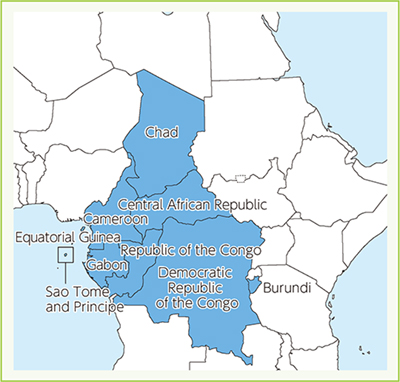Diplomatic Bluebook 2018
Chapter 2
Japan's Foreign Policy that Takes a Panoramic Perspective of the World Map
3 Central Africa

(1) Gabon
Gabon has experienced no civil war nor conflict since gaining independence in 1960. Following the death of Former President Omar Bongo, who served as president for 41 years, a peaceful presidential election was held in August 2009 and the son of the former president, Ali Bongo, was elected (he was also reelected in 2016). Reform of the country's economic structure, which is dependent on oil and other natural resources, is a pressing issue. Efforts are being made to diversify the country's industries and increase added value to products through local processing of primary commodities.
(2) Cameroon
Since 1982 Cameroon had a stable administration under President Biya. In 2016 dissatisfaction increased in the Anglophone Northwestern and Southwestern Regions bordered by Nigeria. With ordinary citizens' participation in demonstrations, disagreement sharpened gradually and grew into political movements calling for the restoration of the federal system and independence for Anglophone territories. President Biya has criticized attacks on security forces as being the work of terrorist groups and has indicated that he will take all necessary measures.
(3) Republic of Congo
The Republic of Congo gained independence from France in 1960. The country is dependent on oil, which accounts for approximately 80% of its exports. The drop in oil prices has therefore caused the economy to stagnate, and economic diversification is now a pressing issue for the country. A presidential election was held in March 2016 under the new constitution promulgated in 2015, and President Sassou-Nguesso was re-elected for three consecutive terms. The country has remained stable since the election. Although armed rebels had been operating in the Department of Pool, the main rebel group headed by Ntumi signed a peace agreement in December. It was announced that the group had agreed to cooperate with the disarming of the “Ninja” militia and that it would not interfere with the reestablishment of state control in the Pool Department. The situation in the Department is being stabilized after the announcement.
(4) Democratic Republic of the Congo
The Democratic Republic of the Congo gained independence from Belgium in 1960. It is one of the world's leading producers of cobalt and other natural resources. A UN mission was deployed in 1999 to monitor a ceasefire established following the conflict that broke out in 1998. In 2010 this mission was renamed as the United Nations Organization Stabilization Mission in the Democratic Republic of the Congo (MONUSCO), and it is now working to help the country recover from the conflict and respond to rebel groups in eastern regions.
Although President Kabila's second term in office came to an end in December 2016, no elections were held and President Kabila has remained in office, causing tensions to escalate. The election was not held in 2017 and has been postponed until December 23, 2018.
(5) Equatorial Guinea
Equatorial Guinea is the only country in Africa with Spanish as its national language. Until the early 1990s, it was one of the world's poorest countries and was dependent on agriculture (cacao and timber). During the 39 years under the long-term administration of President Nguema, the country has developed into one of sub-Saharan Africa's top oil producers, with oil production commencing in 1992. With the rapid economic growth, progress has been made with the creation of economic infrastructure such as road networks, and public buildings. Enhancing social infrastructure in the fields of education, medicine, and healthcare, and addressing disparities between the rich and poor, however, are long-standing issues.
Equatorial Guinea is serving as a non-permanent member of the UN Security Council for a two-year period beginning in January 2018.
